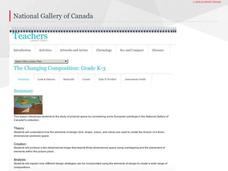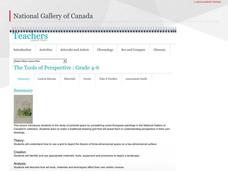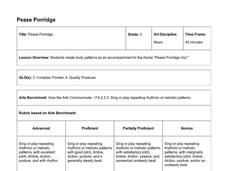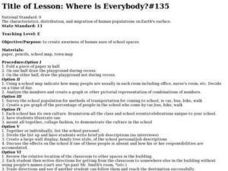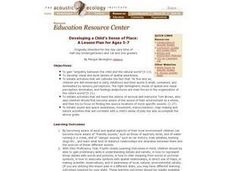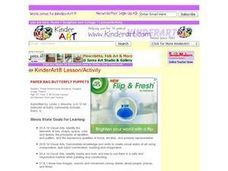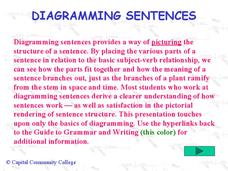Curated OER
An Introduction To Pictorial Space
Students draw a picture of a landscape using techniques that create the illusion of space. They then transform this landscape drawing into a three-dimensional form, which depicts a mood or an emotion.
NASA
A Pictorial History of Rockets
3, 2, 1: Blast off! Take a look at the history of rockets through a camera lens. A set of 41 cards displays more than 2,000 years of rockets, from their use as toys to space flight.
Curated OER
Galaxy Adventure
Working in groups, learners create a mnemonic device, give an oral presentation, and create a pictorial representation of the correct sequence of the planets and asteroid belt from the sun. An assessment rubric is included in the lesson.
National Gallery of Canada
The Changing Composition
Play with dimensions and practice making a two-dimensional scene look three-dimensional. Class members view pieces of art and then make their own scenes by layering different materials and drawing in details. Check out all the tabs for...
National Gallery of Canada
Mastering One-Point Perspective
Cover one-point perspective through observation and practice. Class members examine several works of art that use one-point perspective, look at magazine images to find the vanishing points and horizon lines, and draw their own city...
National Gallery of Canada
The Tools of Perspective
Make a study of perspective in the real world. Learners examine and discuss works of art that show examples of perspective before trying their own hands at it. Using a grid drawn on transparent paper, class members transfer a view from a...
Technical Sketching
Introduction — Surfaces and Edges
How different can 3-D and 2-D really be? An engineering resource provides an explanation about the importance of two-dimensional technical drawings. Several samples show how to create multi-view drawings from pictorials and vice-versa....
Hawaiʻi State Department of Education
Pease Porridge
Practice using different ways to express a single pattern. The class uses concrete, pictorial, and numerical modes to represent patterns found in a simple rhyme. They will move their bodies, use body percussion, draw, and use numbers to...
Curated OER
Knowledge Rating Scale Vocabulary Activity #2 Bud, Not Buddy
As your kids read chapters nine through eleven, present them with this vocabulary chart. Nine vocabulary words are shown, and pupils must decide if they know it well, have heard it, or have no clue what it means. Consider re-creating...
Curated OER
What’s That, I Can’t Hear You?
Students investigate forms of energy as well as light and sound. In this science lesson, students participate in hands-on activities that require them to evaluate how sound affects astronauts in flight. A video of this lesson being...
Curated OER
Where is Everybody?#135
Students examine the human uses of school spaces through a variety of activities. They draw the playground during recess and not during recess. They determine how many people use each room at different times before graphing the...
Curated OER
Look Ma! I'm a Rocket Scientist!
Students use a ball to push and pull to demonstrate the concept of force. In this force lesson plan, students talk about the importance of force in space and use balls to demonstrate this phenomena.
Curated OER
Developing a Child's Sense of Place
Students develop empathy with the natural world; visual and aural senses of spatial awareness; and initiate sound and space awareness, movement, indoor/outdoor, map-making and nature activities that correlate with a child's sense of play.
Curated OER
Creating your Frog's Environment
Students discuss where frogs can live. After the discussion, they create an environment for a frog using items of their choice. Some may include: construction paper, paint, magazines. The environment could even be 3-D. The key to this...
Curated OER
Write a Short Story
Students compare two paintings, depicting urban life in America in the 1940's, answering a series of questions, then create a short story about the paintings' characters. They compare 'Nighthawks' and 'Nightlife.'
Curated OER
Creating Relief Sculpture
Students design and create a sculptural relief using modeling clay.They create latex rubber molds and then produce relief sculptures using Sculptamold.
Curated OER
Paper Bag Butterfly Puppets
Whether you're using it to tell stories, explore the letter b, or during a life science lesson, these butterfly puppets will be a hit. Youngsters use crayons, tissue paper, and paper bags to create butterfly puppets.
Alabama Learning Exchange
Introduction to Division
Examine how addition, subtraction, multiplication, and division relate to and are separate from each other. As they listen to the book, The Doorbell Rang, they demonstrate the math described in the story by cutting up paper cookies and...
Curated OER
Diagramming sentences
In an orderly fashion, go through diagramming sentences with your class. Beginning with a simple sentence and the placement of subject and verb, subsequent slides slowly add on more branches and lines with explanations of sentence types...
Curated OER
Questions in Art History
This worksheet provides a wonderful scaffold for those learning how to analyze art in a critical and thoughtful way. It describes what art historians do, then requires learners to view and analyze one of the listed works. Twelve...
Curated OER
African American Literature in Art
Pupils compare art and literature by examining a contemporary painting by Glenn Ligon and the essay by James Baldwin that inspired it. They write an essay about a personal experience that relates to the theme of being an "outsider."
Curated OER
Finding Polygons in Cubist Art
Fourth graders explore geometric properties and relationships in a two-dimensional work of art. They first search for and identify polygons in a Cubist painting and then use polygons to create their own Cubist portrait of a classmate.
Curated OER
Mandala Art Lessons
Mandala art lessons provide easy and fun ways to learn about art, math, and other cultures.
Curated OER
"A Pig is Big"
Students explore the concept of big, bigger, and biggest. They examine and classify items by size, listen to and discuss the book "A Pig is Big," complete a fill in the blank activity, and create a tri-fold that illustrates two items...





